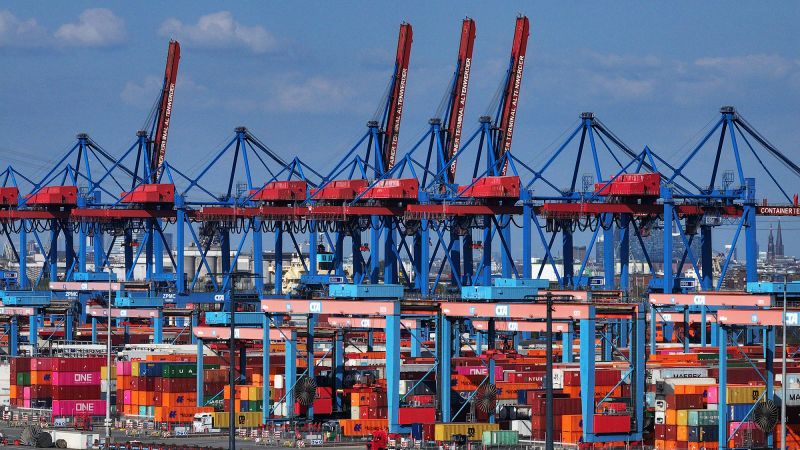EU-China Summit: Key Details and Impact on Relations

Introduction
At the recent EU-China summit, Ursula von der Leyen, President of the European Commission, met with Chinese President Xi Jinping to discuss the current state of EU-China relations. In her opening remarks, von der Leyen described the relationship as being at a critical "inflection point." This statement highlights the growing tensions between the two global powers and sets the tone for the discussions that followed.
Key Details
One of the main issues that the EU leaders addressed was the trade surplus between the EU and China. The EU has long expressed concerns about the imbalance in trade, with China exporting more goods to the EU than importing. This has led to calls for China to open its markets and create a more level playing field for trade. Additionally, the EU leaders also raised concerns about China's support for Russia's actions in Ukraine, which goes against the EU's stance on the conflict.
Impact
The outcome of this summit could have a significant impact on the future of EU-China relations. With tensions already high, the discussions at the summit could either improve or further strain the relationship between the two powers. The EU's concerns about trade and support for Russia's actions in Ukraine are crucial issues that need to be addressed for the relationship to move forward positively. It remains to be seen how China will respond to these concerns and what steps will be taken to improve the
About the People Mentioned
Ursula von der Leyen
Ursula Gertrud von der Leyen is a German politician and physician, serving as the President of the European Commission since 2019. She was born on October 8, 1958, in Brussels, Belgium, to German parents. Her father, Ernst Albrecht, was one of the first European civil servants. Von der Leyen graduated from the London School of Economics in 1978 and obtained her medical license from Hanover Medical School in 1987. Von der Leyen has had a distinguished career in German politics. She was a member of the German Bundestag from 2009 to 2019 and held various cabinet positions under Angela Merkel, including Federal Minister of Defense from 2013 to 2019, Federal Minister of Labor and Social Affairs from 2009 to 2013, and Federal Minister for Family Affairs, Senior Citizens, Women and Youth from 2005 to 2009. Prior to her federal roles, she served as Minister for Social Affairs, Women, Family Affairs, and Health in Lower Saxony from 2003 to 2005. As President of the European Commission, von der Leyen has played a pivotal role in shaping EU policies, particularly during challenging times such as the COVID-19 pandemic and Russia's invasion of Ukraine. She has been a strong advocate for the EU Green Deal, aiming to make Europe the first climate-neutral continent by 2050. Her leadership has been recognized globally, with *Forbes* naming her the most powerful woman in the world in 2022, 2023, and 2024. Recently, von der Leyen was re-elected for a second term by the European Parliament in July 2024, ensuring her leadership until 2029. Her current priorities include navigating ongoing geopolitical challenges and advancing the EU's strategic agenda. Throughout her tenure, she has emphasized the importance of maintaining the EU's long-term goals despite global uncertainties.
Xi Jinping
Xi Jinping is a prominent Chinese politician born on June 15, 1953, in Fuping, Shaanxi Province. He is the son of Xi Zhongxun, a veteran of the Chinese Communist Party (CCP). During the Cultural Revolution, Xi was sent to rural Yanchuan County, Shaanxi, where he eventually joined the CCP in 1974. He studied chemical engineering at Tsinghua University as a worker-peasant-soldier student and later earned a Doctor of Law degree from the university through an in-service graduate program in Marxist theory and ideological and political education[1][5]. Xi rose through the ranks of the CCP, serving as governor of Fujian from 1999 to 2002 and then as governor and party secretary of Zhejiang from 2002 to 2007. He briefly served as the party secretary of Shanghai in 2007 before joining the Politburo Standing Committee the same year. In 2012, he became the general secretary of the CCP and chairman of the Central Military Commission, marking the beginning of his tenure as China's paramount leader. Since 2013, Xi has also held the position of President of the People's Republic of China[1][3]. Under Xi's leadership, China has made significant strides in reducing poverty and curbing corruption. He has been praised for his efforts in these areas, which were highlighted in a historical resolution passed by the CCP in 2021[3]. Recent developments include Xi's re-election to a third term as general secretary of the CCP in October 2022 and his third term as president of China in March 2023, following constitutional changes that removed term limits for the presidency[3]. Xi's influence has been further solidified by the composition of the 20th Politburo Standing Committee, which consists of his loyalists[3].
About the Organizations Mentioned
European Commission
The European Commission is the executive branch of the European Union (EU), responsible for proposing legislation, implementing decisions, upholding the EU treaties, and managing the day-to-day business of the Union. Its primary role is to act as the “guardian of the treaties,” ensuring that EU law is applied uniformly across all member states. The Commission is composed of one commissioner from each EU country, led by a President—currently Ursula von der Leyen—who sets the political direction for the institution. ## History and Evolution Established in 1958 as part of the European Economic Community, the Commission’s powers and responsibilities have expanded alongside the EU itself. Over decades, it has evolved from a technocratic body focused on economic integration to a central player in shaping Europe’s political, social, and digital future. The Commission has been instrumental in creating the single market, launching the euro currency, and driving forward major treaties such as Maastricht and Lisbon. ## Key Achievements The Commission has overseen transformative projects like the European Green Deal, aiming to make Europe the first climate-neutral continent by 2050, and the Digital Single Market, which seeks to harmonize digital regulations and boost Europe’s tech competitiveness. It has also been a driving force behind landmark regulations in data protection (GDPR), artificial intelligence (AI Act), and antitrust enforcement against global tech giants. ## Current Status and Priorities In 2025, the Commission’s work programme underscores a focus on sustainable prosperity, security, competitiveness, and regulatory simplification[1][2][4]. Major initiatives include the Clean Industrial Deal to decarbonize industry, the AI Continent Action Plan to position Europe as a leader in artificial intelligence, and a push to reduce administrative burdens by at least 25% for businesses—especially small and medium-sized enterprises (SMEs)[1][3][6]. The Commission is also prioritizing the modernization of the single market, investment in clean energy, and strengthening Europe’s strategi
EU
## Overview The **European Union (EU)** is a unique political and economic partnership of 27 European countries that have chosen to work together to promote peace, stability, and prosperity across the continent[4]. Founded in the aftermath of World War II, the EU’s original goal was to foster cooperation among nations to prevent further conflict. Today, it is a major global actor in business, technology, regulation, and international affairs[6]. ## What the EU Does The EU operates as a **supranational union**, meaning it has authority over certain policy areas that transcend national borders, such as trade, competition, environmental standards, and digital regulation[1]. Its institutions—including the European Commission, Parliament, and Council—create laws and policies that member states must adopt, ensuring a level playing field for businesses and citizens across the bloc[6]. The EU’s **Single Market** allows goods, services, capital, and people to move freely, though persistent regulatory barriers still hinder full integration, particularly in services[5][7]. The euro, used by 20 member states, is one of the world’s leading currencies. ## History The EU traces its roots to the 1951 European Coal and Steel Community, founded by six countries: Belgium, France, Germany, Italy, Luxembourg, and the Netherlands[4]. Over decades, successive treaties expanded its scope and membership. The **Maastricht Treaty** (1993) formally established the EU, and subsequent enlargements brought in countries from Central and Eastern Europe after the Cold War[1]. The **United Kingdom’s exit** in 2020 (Brexit) reduced membership from 28 to 27[4]. ## Key Achievements - **Peace and Stability**: The EU is widely credited with helping maintain peace in Europe for over 70 years. - **Economic Integration**: The Single Market and euro have boosted trade, investment, and economic resilience. - **Regulatory Leadership**: The EU
China
China is not an organization but a sovereign nation and the world’s second-largest economy, playing a pivotal role in global business and technology. Since initiating economic reforms in 1978, China has transformed from a largely agrarian society into an upper-middle-income country with an average GDP growth of over 9 percent per year for decades, lifting nearly 800 million people out of poverty[2]. The country’s economic model initially focused on investment and export-oriented manufacturing but is now shifting towards higher-value services, domestic consumption, and low-carbon growth to address social, environmental, and structural challenges[2]. China’s government heavily directs industrial policy, promoting domestic innovation and technological self-reliance through plans like “Made in China 2025” and the 14th Five Year Plan (2021-2025). These initiatives target advanced technology sectors such as robotics, aerospace, new energy vehicles, biopharmaceuticals, and high-tech manufacturing, aiming to replace foreign technologies with domestic alternatives and expand China’s global market presence[3]. This industrial strategy combines state subsidies, preferential policies, and strict market access controls for foreign firms, shaping a competitive environment favoring national champions[3]. Despite solid economic growth—real GDP grew by 5.4% year-on-year in early 2025—China faces headwinds including demographic shifts, slowing productivity, a cooling property market, and global trade uncertainties. Growth is projected to moderate to around 4.5% in 2025 and 4.0% in 2026, with fiscal stimulus helping to offset some challenges[1][3][6]. Externally, China remains a major global exporter, with exports outpacing GDP growth in 2025[6]. Notably, China’s governance under President Xi Jinping has tightened control over civil society, media, and minority regions, drawing international scrutiny for human rights issues and repression, especially of Uyghurs and Tibetans[4][9]. Meanwhile, Chin



















